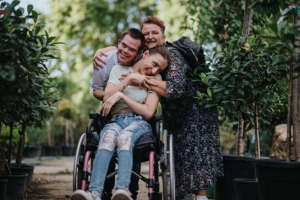Netflix, in partnership with the Production Guild of Great Britain (PGGB), has announced a new training programme aimed specifically at deaf, disabled, and neurodivergent accountants looking to build careers in film and television. The year-long initiative, fully funded for five participants, combines five weeks of classroom learning with hands-on placements on Netflix productions, offering trainees a direct path into future industry roles. Applications close on 4 November 2025, with the course beginning on 25 February 2026.
The scheme builds on a programme first launched by PGGB two decades ago, with Netflix joining as a partner in 2018. Since then, graduates have worked on major productions such as Bridgerton, Supacell, and My Oxford Year. Organisers say the 2026 intake reflects a renewed focus on creating a more inclusive and diverse workforce, ensuring that underrepresented groups have clear opportunities to step into Assistant Production Accountant roles.
Support will also be provided by Access All Areas, a creative organisation that mentors people with learning disabilities and autistic individuals. Alumni of previous cohorts have praised the course for providing vital contacts, knowledge, and access to an industry that can otherwise be difficult to enter. Many have gone on to work on both independent projects and large-scale productions.
Industry leaders describe production accountants as central to the smooth running of film and TV projects, yet acknowledge that these roles have lacked diversity. By opening doors to new talent, the scheme aims to create a more inclusive pipeline of professionals, while strengthening the finance side of production for years to come.
Several leading autism organisations in the UK have spoken out against new claims from the US suggesting that paracetamol use during pregnancy could increase the risk of autism in children. Ambitious about Autism, Autism Alliance, Autistica, and the National Autistic Society said the evidence behind the claims is “very weak” and based on flawed studies. They pointed to well-conducted research showing no credible link, urging expectant parents to continue following NHS advice on safe medication use in pregnancy.
The claims came from the US Department of Health and Human Services during an event led by President Donald Trump and HHS Secretary Robert F. Kennedy, Jr. The announcement included warnings about paracetamol (acetaminophen) and outlined new steps for addressing autism. While the US Food and Drug Administration acknowledged conflicting research, it advised doctors to use the lowest effective dose when prescribing paracetamol to pregnant women, balancing potential risks against the dangers of untreated fever.
The FDA also signaled plans to expand the use of leucovorin, a folate-based treatment, for children with autism who show speech-related challenges. Early studies suggest leucovorin may improve language and social abilities in certain cases, though experts stressed it is not a cure and must be combined with other therapies. Larger clinical trials are now being planned by the National Institutes of Health.
UK charities emphasised that there is no drug or therapy that “cures” autism and criticised repeated inaccurate claims from the Trump administration. They argued that rising autism rates reflect better awareness and improved diagnosis, not environmental causes. Experts warn that misleading statements risk stigmatizing autistic people and distracting from vital research focused on support and inclusion.
More than 90 MPs spent three hours debating whether to preserve the legal right to assessment and support for children with special educational needs and disabilities (SEND). The discussion followed a petition by Save Our Children’s Rights, now topping 125,000 signatures, urging ministers to keep current law so vulnerable pupils can access education and thrive. On the same day, a rally by the Disabled Children’s Partnership, SEND Sanctuary and Let Us Learn Too pressed for reform with firm red lines to safeguard existing rights.
Campaigners fear the forthcoming Schools’ White Paper could dilute statutory support or phase out Education, Health and Care Plans (EHCPs). They argue the system’s strain stems from underfunded education, health and social care, not from EHCPs themselves. Plans confer enforceable entitlements and a conditional right to choose a school; without one, there is no duty on schools to meet a child’s specific needs. Supporters contend these rights save money later by reducing adult costs.
Opening the debate, Dr Roz Savage MP called EHCP protections “essential, not optional”, citing Institute for Fiscal Studies analysis: since 2018, EHCP numbers have risen nearly 80% (from under 3% to over 5% of pupils); high-needs deficits could hit £8bn by 2027; independent special school places cost more than double state equivalents. MPs repeatedly stressed early intervention, inclusion, accountability, and an end to parent-blaming.
Summing up, Education Minister Georgia Gould prioritised early help, community-based support and working with families on reforms. Rachel Filmer of Special Needs Jungle welcomed the cross-party defence of legal rights—but warned MPs must hold the line if the White Paper falls short.
DanceSyndrome, a pioneering dance charity that creates opportunities for people with learning disabilities, has secured over £340,000 from The National Lottery Community Fund to expand its work. Founded in 2009 by Jen Blackwell, who has Down’s syndrome, along with her parents, the project was born out of Jen’s struggle to find inclusive community dance opportunities.
The organisation currently runs four weekly Everybody Dance community sessions in person, alongside five online classes, as well as offering training and performance opportunities. With the new funding, DanceSyndrome aims to extend its reach by 2030, particularly by opening up pathways for children with learning disabilities to engage in dance at all stages of life.
At the heart of its success is a co-production model. This approach sees Dance Leaders with learning disabilities work side-by-side with professional artists, shaping accessible sessions together. Jen explains that this model is crucial, as it challenges perceptions of disability and demonstrates what people can achieve with the right support. Participants have reported boosts in confidence, independence, and a stronger sense of belonging.
In 2023, the charity also launched the DS Youth Collective, which highlighted the demand for more inclusive opportunities for children and young people. Managing Director Julie Nicholson said the new funding will help deliver accessible dance activities across the North West and beyond, ensuring families can enjoy the transformative benefits of dance in their communities.
People with learning disabilities who develop type 2 diabetes face a greater risk of dying from the condition, despite often showing better blood sugar control than others. A large-scale study published in BMJ Open Diabetes Research & Care found that although rates of vascular complications were similar, those with learning disabilities were 20% more likely to experience faster disease progression and require insulin therapy sooner. They were also more likely to already be on treatment for diabetes or high blood pressure and to present with complications at the time of diagnosis.
Researchers examined anonymised health records of more than 280,000 adults newly diagnosed with type 2 diabetes in the UK between 2004 and 2021. Of these, just over 2,000 had a learning disability. This group was typically younger at diagnosis – average age 51 compared with 64 – and included higher numbers of men, people with severe obesity, White ethnic backgrounds, and individuals living in areas of deprivation.
The study’s authors stressed that managing type 2 diabetes can be especially difficult for people with learning disabilities, as it requires consistent monitoring and self-management. They suggested that more tailored support and adjustments from healthcare professionals could improve outcomes, including longer consultations and clearer communication.
Previous research has highlighted barriers to care, such as a lack of diabetes knowledge among caregivers and insufficient accessible information. The authors recommend better training for both staff and carers, and greater efforts to ensure individuals with learning disabilities are supported to take an active role in managing their condition.
New findings from the Office for National Statistics (ONS) suggest that children experiencing mental health problems are less likely to miss school if they receive additional support, such as Education, Health and Care Plans (EHCPs), targeted SEND provision, or free school meals. The analysis, carried out with Loughborough University, reviewed data from 1.1 million children aged 5 to 16 living in two-parent households across England between 2021 and 2022.
The study revealed a clear link between school absence and mental ill health. Among children with no absences, only 1.82% were identified as having a mental health condition. This rose to 3.7% for pupils missing 20% of lessons, and more than 5% for those absent nearly a third of the time. While pupils with SEND, chronic illness or disadvantaged backgrounds generally have higher absence rates, those with mental health difficulties in receipt of structured support showed a smaller increase compared to peers without such provision.
ONS spokesperson Louise Vesely-Shore MBE highlighted that schools play a pivotal role in supporting young people: “Absence is clearly linked to poorer mental health, but when children with difficulties have access to EHCPs or other targeted support, the impact is lessened.”
The work, funded through the British Academy Innovation Fellowship, marks the first major linkage of education, health, and family data in England. It follows a call from the Children’s Commissioner to ensure EHCPs are reserved for pupils with complex, cross-sector needs, while protecting those who already have them.
A major review from King’s College London has revealed that most autistic adults over the age of 40 have never received a diagnosis, with the proportion even higher among those over 60. The research, published in the Annual Review of Developmental Psychology, found that older autistic people are at greater risk of poor mental and physical health compared to their non-autistic peers, as well as facing difficulties with relationships, work and general wellbeing.
The findings suggest that undiagnosed autistic adults are far more likely to struggle with depression, anxiety and other health problems. Those with high autistic traits were also reported to be six times more likely to have suicidal thoughts or engage in self-harm. Alongside this, older autistic adults were found to encounter more barriers in accessing healthcare, often due to systems not being designed with their needs in mind, including communication differences, sensory sensitivities and inconsistent support from professionals.
The review also highlighted higher rates of chronic conditions such as cardiovascular disease, immune disorders, neurological problems and gastrointestinal issues. These challenges are compounded by risks linked to ageing, including Parkinson’s disease, arthritis, cognitive decline and dementia. Social isolation, limited networks and a lack of tailored resources further affect quality of life.
Researchers stressed that underdiagnosis has left many autistic adults without appropriate recognition or support throughout their lives, making them particularly vulnerable as they age. They argue that autism needs to be fully integrated into ageing research, with greater involvement from autistic communities to ensure services and policies reflect their lived experiences.
The Down’s Syndrome Association has created a set of resources designed to help children and young people with Down’s syndrome, as well as those with special educational needs and disabilities (SEND), prepare for the transition back to school. Recognising that the start of a new school year can be a challenging period for pupils, families and teachers, the charity stresses the importance of careful planning to reduce stress and ease children back into routines.
Among the resources is a practical checklist for families, which includes using social stories or picture booklets to introduce children to school staff, buildings and timetables. Parents are also encouraged to visit the school grounds in advance. The guidance highlights that pupils with SEND are entitled to an appropriate education under the 2014 SEND Code of Practice. This includes taking part in lessons, being taught by qualified teachers, accessing work suited to their abilities and being included in wider school life such as clubs, trips and assemblies.
The Association has also provided advice on navigating Education, Health and Care Plans (EHCPs), with clear explanations on how these should be tailored to a child’s needs. This is particularly timely given anticipated changes to EHCPs in the Department for Education’s upcoming Schools White Paper.
Practical tips are also offered on building strong relationships with schools. Parents are encouraged to maintain open, constructive communication, avoid overwhelming teachers with demands and allow staff the time to understand each child’s unique needs. Additional resources for teachers emphasise strategies such as structured routines, daily practice of key skills and adapting lessons to support learning strengths and challenges.










